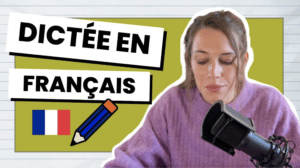Transcript of the video
Hello everyone. I hope you're all well and ready for another round of responses to your comments about expressions in French.
Before you start, remember to activate the French subtitles. It will help you understand and remember the video better.
If you are new to the channel, don't forget to subscribe so you don't miss any video.
Last week, I gave you a first session of answers to your questions in comments. And you really liked it. So this week, I've decided to continue answering your comments.
Let's start with an initial question. What does SDF mean? The French acronym SDF stands for sans domicile fixe. In France, when we talk about the SDF, we're talking about homeless people, people who live on the streets, who don't have a house or an apartment.
The next question or comment concerns the expression "en l'occurrence". What does this expression mean in French?
Just note that "en l'occurrence" is spelled with an E, not an A. "En l'occurrence" is an expression used in French to emphasize a specific case. It means in this case, in the present case, concerning this precise situation. I'm going to give you some examples and context to help you understand.
For example, if you're in an appliance store and you come in to buy a fridge, a salesperson will come up and say, "Hello, are you looking for a fridge?"
You can answer, "Yes, in this case, an American fridge that makes ice cubes". You're making a point.
Here's a second example, again in dialogue form. "We had a fight with Isabelle. "No, you cheated on her again, didn't you?" "As it happens, no. It was she who cheated on me. She's the one who cheated on me. You want to add a clarification, to assert a piece of information in this particular case.
In the following commentary, there are two questions. Let's start with the first. What does "might as well tell you that" mean?
You can say "I might as well tell you that" if you're polite with the person. If you're on a first-name basis, you'll say "autant te dire que". You can also simply say "autant dire que" (as much as you can say that), without using either the formal or informal form of address. What does "might as well tell you that" mean? It means, in short, in conclusion. I'll give you some examples, some context, to help you understand.
For example, I might say "I've got three kids, a job and I go to the gym five times a week. I might as well tell you that I don't have time to learn French".
Here's a second example: "The only dish I know how to cook is an omelette. Suffice to say, I'm not a very good cook.
The second question in this commentary concerns the expression "c'est limite". When we say that something is borderline, in French we mean that it's borderline, that it's not very acceptable. You can do it, but it's not very good. Here are two examples to help you understand this expression.
For example, if I say to someone, "I'm going to be 10 minutes late to the restaurant, do you think they'll hold the table for me?", "It's borderline, but I think I'll be okay".
Here's a second example. In France, it's not customary to wear a white dress when you're invited to a wedding and you're not the bride. You might ask, "Is it okay to wear a cream-colored dress? I'll tell you, it's borderline. It's not really done.
So Salam's next question is what does "sauver les meubles" mean? When we say that we save the furniture, in French we mean that we limit the damage, that we preserve what's essential, that we preserve what's most important. Here are two contextualizations to help you understand.
I failed my math exam and I also failed my English exam. I need to get a good mark, a very good mark, on my French exam to save the day.
Here's a second example. My restaurant is on the verge of bankruptcy due to the health crisis. To save the day, my banker has advised me to lay off half my staff. It's the only way to keep my restaurant from going under.
The last comment we're going to look at today concerns the verb douter. It's true that in French, we use "douter" or "doute" in numerous expressions which sometimes mean different things, and sometimes even things that are a little opposite.
The question concerns the difficulty of understanding the meaning of "je doute", "je me doute", "sans doute" and "sans aucun doute". Let's look at these different uses of the verb douter or doubt one by one.
The first is "I doubt", so the verb douter is used when you're not sure about a situation or someone. For example, I might say "I'm very afraid of failing my French exam. I doubt my knowledge." So, I'm afraid of failing, I doubt myself, I'm not sure of myself. That was the case where you can doubt a situation. But you can also doubt someone, as I was saying. For example, I can say "I told my sister a secret, but I really doubt her.
I'm sure she'll tell all her girlfriends. I don't trust her.
So we can also say "to doubt". We use the verb douter, but with a reflexive pronoun, so "il se doute", "je me doute", "vous vous doutez", "nous nous doutons", for example. When it's used with the reflexive pronoun, it means we have suspicions, we have an instinct that gives us the impression that something, some situation is going to happen or that someone is going to say something or do something.
Here's some background. I'm planning a surprise birthday party for my husband. I have a feeling he suspects something. I think he's figured out that I'm throwing him a party.
The question also included the expression "without doubt". You might think that without doubt means that there's no doubt at all, but that's not what it means. "Without doubt" means probably, certainly, but we're not 100% sure %. Here are some examples to help you understand.
"Do you think Ben will be here on time?", "No doubt, he's usually punctual". So it's, I think, probably, but I can't be sure and certain.
Here's another example. "Do you think Corinne will be here before noon?", "Probably. She told me she was coming by this morning". So, you really believe it, but you're not 100 % sure.
And finally, the last expression with the word "doubt" that was used in the commentary was "sans aucun doute" or "no doubt". This expression is used to assert that you're sure and certain about something or a situation. Here's a little sample dialogue to help you understand.
"Do you think I'll pass my French exam?", "Without a doubt. You've studied hard, you'll pass. I have no doubt." So you're sure and certain.
That's it for today. I hope you've enjoyed this video, that you've learned something new thanks to the comments, thanks to the questions you've left in the comments.
If you liked this video, don't forget to put a like on it and, if you are new, don't forget to subscribe to the channel.
See you soon.








